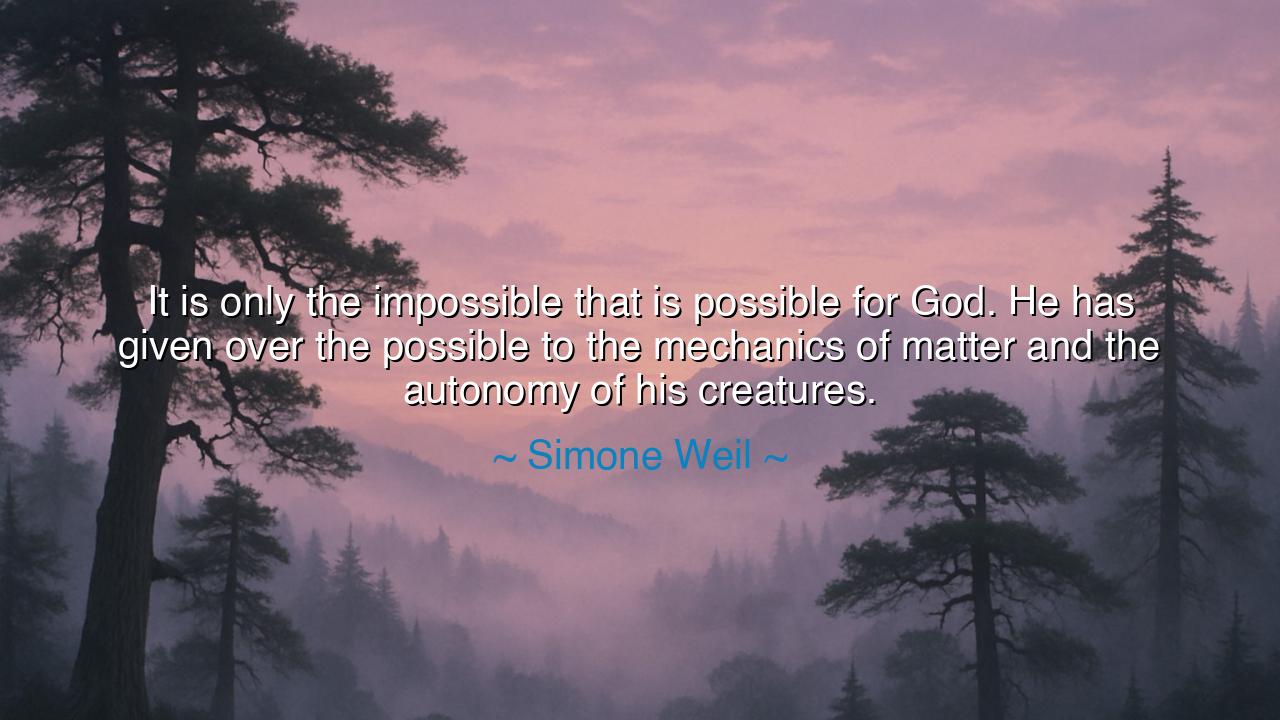
It is only the impossible that is possible for God. He has given
It is only the impossible that is possible for God. He has given over the possible to the mechanics of matter and the autonomy of his creatures.






"It is only the impossible that is possible for God. He has given over the possible to the mechanics of matter and the autonomy of His creatures." — These words of Simone Weil strike with the quiet force of divine mystery. They invite us into the sacred understanding that God’s power transcends the limits of the natural world. While the laws of nature govern the possible, the miraculous and the profound — those moments when the laws of physics, logic, and reason seem suspended — belong to the realm of the Divine. In this, Weil is not speaking of a mere suspension of natural laws, but of a deeper, more profound truth: that God, in His omnipotence, works in ways that the human mind can scarcely comprehend, but which reveal His eternal will.
In the ancient teachings, there was a constant recognition that the universe, in all its beauty and complexity, is held together not by blind mechanical forces but by a deeper intelligence — an intelligent design. The Greek philosophers such as Plato and Aristotle understood the world in terms of both reason and mystery. They saw the visible world as a reflection of higher, divine principles, and yet they acknowledged the limits of human understanding. There was always a space, they believed, for the impossible, where reason must give way to the divine mystery that could not be reduced to mere logic or observation. Simone Weil, in echoing this truth, affirms that while matter and nature may function according to set laws, the true power of God is seen in the impossible — that which transcends all that we know.
Weil’s words invite us to reflect on the very essence of divine omnipotence. God’s ability to achieve what seems impossible is the cornerstone of faith. Consider the biblical story of Moses leading the Israelites out of Egypt. The parting of the Red Sea was not simply a remarkable event; it was a moment that defied all reason, a miracle that could not be explained by any natural law. In that moment, God did not simply intervene in the mechanics of nature — He defied them, creating a space where impossibility became the very vehicle of salvation. The story does not merely illustrate the power of God, but the truth that God’s realm is not limited by what is possible according to human understanding.
The same truth is evident in the life of Jesus Christ. The resurrection, a miraculous event that defies the natural order, speaks directly to the impossibility made possible through God’s will. The laws of nature say that death is final, irreversible. But in the life and death of Christ, God shows that He is the master of not just the laws of matter, but the limits of human possibility. The resurrection is not just an event; it is a declaration that God reigns over all things — seen and unseen, known and unknown. It teaches us that even when all seems lost, and the possible has been exhausted, God’s power can still break through, offering a new hope beyond what we can comprehend.
What Simone Weil suggests, then, is that God’s power does not exist within the confines of the possible. The possible is governed by the natural world, by the mechanisms that hold the universe together, and by the free will of His creatures. But it is in the impossible where we witness God’s true dominion — in miracles, in acts of grace, in the unfolding of divine purpose that cannot be contained by our understanding. The lesson here is that, in our lives, when we encounter the impossible, it is not a signal of failure, but an invitation to trust in a higher reality — one that God governs with wisdom and love.
In our own lives, we must recognize that the possible and the impossible are not opposites but interconnected realms in God’s vast creation. When we strive to work and achieve within the realm of the possible, we honor the mechanisms of creation that God has set in place. But when we face the impossible — a challenge too great, a pain too deep, a sorrow too profound — we must open our hearts to the mystery of God’s power. In those moments, we are invited not to despair but to place our trust in God’s ability to transcend what we know, and to bring miracles where there seem to be none.
Thus, let us live with the understanding that God works in both the natural and the supernatural realms. In the possible, He governs with order and purpose, and in the impossible, He reveals His majesty and glory. Let us not limit our prayers or our faith to what seems achievable, but trust that in the impossible, God is at work. And when faced with the unknown or the unexplainable, let us turn our hearts to the Divine, knowing that with Him, even the impossible is but a stepping stone to a greater revelation of His eternal power and love.






AAdministratorAdministrator
Welcome, honored guests. Please leave a comment, we will respond soon